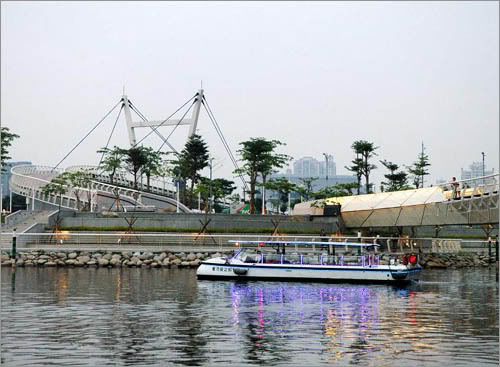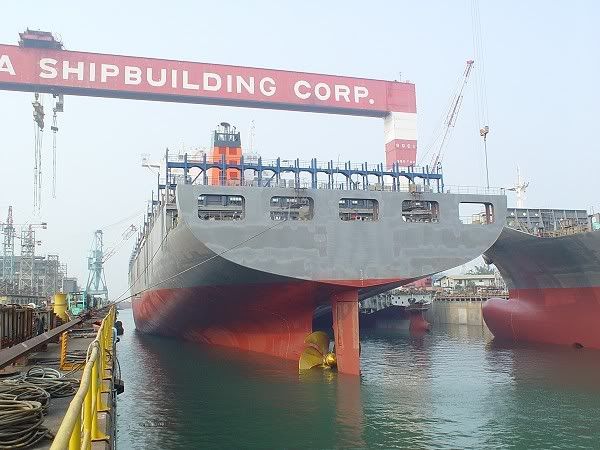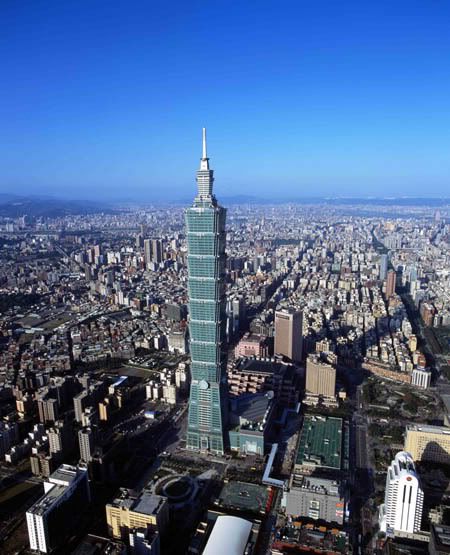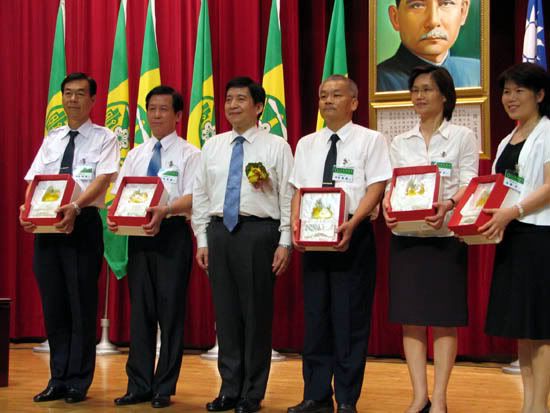Road to Reform-- Five Years of President Chen
To leave a bright legacy when he leaves his post in 2008, President Chen is working for constitutional, financial, and governmental reforms, as well as pushing for diplomatic breakthroughs. (Yen Jung-chang)
It's been five years since Chen Shui-bian defeated the long-term ruling party the KMT to take the presidency in 2000. This May 20th, he marked the anniversary of his inauguration as he does every year-by working as a volunteer. In these five years, he has faced many challenges, including political opposition, tension across the Taiwan Strait, and international isolation. But he remains in the vanguard of reform, hoping to lay the groundwork for the continual future development of Taiwan.
In the May 14 election for the ad hoc National Assembly, the two parties which support amending the ROC constitution-the DPP and the KMT-took more than 83% of the vote, or 249 of 300 seats. The DPP's share was 127 seats, or more than 42%. Thus the prospects are good that the constitutional amendments will be passed. For President Chen, long an advocate of constitutional reform, this was surely the best anniversary gift he could have asked for.
It was the first victory in which the pan-greens won over the pan-blues by a substantial margin, but President Chen stressed that the election symbolizes a victory for Taiwan's democratic reform and was not merely a contest between parties.
Rather than giving a speech to commemorate the fifth anniversary of his taking office, Chen instead volunteered at a recycling station run by the Buddhist charity Tzuchi. (Yen Jung-chang)
Constitutional reform
Governmental reform through amending the constitution has been a goal toward which President Chen has strived throughout the five years of his administration.
In his speech at his second inaugural ceremony on May 20, 2004, Chen said that a constitution was the ultimate legal foundation of a nation, and a contract between a government and its people. This nation's constitution had been constrained by the conditions under which it was created, and though it had been amended six times during President Lee Teng-hui's term of office, it still did not suit the nation's present or future needs. Chen then said the constitution needed to be amended to lay the foundation of democratic rule of law and resolve issues such as whether the nation has a three-way or five-way separation of powers and whether it is governed under a presidential or a cabinet system.
He also stated that issues concerning national sovereignty, territorial definitions, and unification or independence would be set aside until a consensus was reached between the nation's political parties. He hoped that before his term was up in 2008, he could give the people of Taiwan a new constitution that suited their current needs.
To avoid the entanglements that occurred during the last six amendments, the president has stressed that the constitutional reform process should not be led by one person or party, nor should it be a temporary fix just to meet present needs. To that end, he planned to form a Constitutional Reform Committee comprised of members of the ruling and opposition parties, as well as legal experts and scholars. The Presidential Office has set up a task force to form the committee.
Following Taiwan's first peaceful transfer of power between political parties in 2000, and the first referendum in 2004, the May 14, 2005 election for an ad hoc National Assembly marks another milestone in Taiwan's political development. If the assembly ratifies the reforms passed by the Legislative Yuan on August 23, 2004-including halving the number of seats in the legislature from 225 to 113, creating a single-member two-vote district voting system, abolishing the National Assembly, enshrining the right to public referendums in the constitution, and making future constitutional amendments ratifiable by referendum-the second stage of the president's reform process will have reached a successful conclusion.
Financial reorganization
In addition to pushing the constitutional reform package, President Chen also set plans to revitalize the economy as a top priority in the face of a sagging world economy. He stated his "three priorities" policy: Taiwan first, the economy first, and investment first. He has also promoted "four directions" for the government: generating new business, attracting foreign investment, reviving the economy and creating jobs.
Chen declared 2001 the Year of Financial Reform, pushing six financial bills in the legislature. To debate these bills, the Legislative Yuan called an unprecedented extraordinary session.
The six bills, seen as a "booster shot" for Taiwan's economy, included legislation on the restructuring of financial institutions, deposit insurance, and business tax, among many others. These bills were designed to force institutions with poor business practices out of the market, and encourage the formation of large-scale institutions through mergers. Since taking effect, they have successfully reduced banks' non-performing loans ratios, and the value of shares in Taiwanese companies held by overseas investors has grown by 250% compared with five years ago, to NT$3.3 trillion. This is indicative of the confidence placed in Taiwan in international financial markets.
Restructuring and tax reform
President Chen has also taken the initiative in pushing forward reforms in the structure of the government and the tax system.
During his first inaugural speech in 2000, he said, "In the area of government reforms, we need to establish a government that is clean, efficient, far-sighted, dynamic, highly flexible and responsive, in order to ensure Taiwan's competitiveness in the face of increasingly fierce global competition. The age of 'large and capable' governments has now passed, replaced by one of 'small and effective' governments, which have established partnership relations with the people."
In September 2004, the Executive Yuan completed a draft of proposed amendments to the Organic Law of the Executive Yuan, which would downsize the executive branch from 36 departments to 13 ministries plus four commissions and five independent agencies. After 17 years, and through the terms of eight premiers, the Executive Yuan has finally made the historic step. If the amendments are ratified by the legislature, the effectiveness of Taiwan's government should take great strides forward.
Another tough target of reform is finance and the tax system. Due to problems accumulated over the years, the government's budget has been getting tighter over the five years of the Chen administration, with government debt mounting at an alarming rate. Taxes, the government's largest source of income, are insufficient to meet the deficit, so in order to keep from saddling the next generation with debt, hampering the government's ability to effectively pursue its policies, and damaging Taiwan's international competitiveness, reform is pressing.
In February of this year, the Ministry of Finance announced it was putting in place a tax reform package that included cuts in inheritance, gift, and land taxes, and a rise in business taxes. While reporting to the legislature, Minister of Finance Lin Chuan also pushed for a minimum tax scheme for businesses and individuals. He proposed creating a draft law to be finished by late June and to be brought before the legislature by the Executive Yuan in late September.
Drive for diplomacy
This series of reforms has kept the president busy, but perhaps his toughest job is that of international relations.
On the eve of Chen's fifth anniversary of taking office, Taiwan re-established diplomatic relations with Nauru, making it the nation's 26th formal ally.
Throughout his years in office, Chen has worked to consolidate the nation's allies through the diplomacy of democracy, humane values, environmentalism, trade and being a good neighbor, paying visits every year to allies in Central and South America, Africa, and the South Pacific. In April 2005, President Chen personally attended the funeral of Pope John Paul II in the Vatican, the first time a Taiwanese leader has made a diplomatic trip to Europe. President Chen's labors in the diplomatic realm show he is fighting against the international isolation pushed on the nation by China.
Over these five years, President Chen has been working to put into practice his vision of "Taiwan standing up and reaching out." During the process, Taiwan encountered its first deficit, as well as SARS, but it overcame these. The road to reform will have its obstacles, and there will be trying times ahead. Only if the people unite and rally behind the president will Taiwan be able to surpass these obstacles and let the beauty of Formosa shine for the world to see.
檔案解密與歷史真相座談會
▲2006.12.10
At the opening ceremony of a forum on decrypting official confidential files and uncovering historical facts, President Chen said, “It is a crucial task of the government to uncover historical truths and deal with the impact of the authoritarian period which continues to affect people to this day.” He went on to say, “It is important that the government speeds up the collection of relevant historical materials, and decrypts, de-classifies, and makes public confidential files on major political cases.”
出席「檔案解密與歷史真相座談會」開幕典禮表示,如何釐清歷史真相,並處理威權時期遺留至今的影響,是當前一件重要的工作。政府應更進一步加速相關史料的徵集,進行重大政治案件機密檔案的解密、整理與公開。
雷震案
▲2002.08
On pages 331 and 332 of Documentary Collection on the Lei Chen Case in Selective Archives of the Ministry of National Defense, published by Adacemia Historica, it is clearly recorded that during a meeting to discuss the Lei Chen case at the Office of the President on October 8, 1960, President Chiang Kai-shek ordered that “Lei Chen’s prison term must be no shorter than ten years” and that “a renewed sentence must not overturn the initial verdict.” Clearly, Chiang Kai-shek interfered with the judiciary and the verdict was meted out without a fair trial.
由國史館發行之「雷震案史料彙編 國防部檔案選輯」第331、332頁,明文記載著四十九年十月八日在總統府集會商討雷震案由,蔣介石總統指示,雷之刑期不得少於十年及覆判不能變更初審判決。明顯介入司法,未審先判。
(2000-2007)台灣成長的軌跡[Preface]
台灣高鐵帶動新空間革命
▲ 台灣高鐵於2007年元旦正式通車,總統表示,高鐵的通車不僅是整個台灣空間革命的再度起飛,更是經濟的再度起飛。(圖由台灣高速鐵路股份有限公司提供)
中部科學園區讓高科技產業根留台灣
▲ 中部科學園區鳥瞰圖(圖由中部科學園區管理局提供)
工程界的奇蹟、台灣的驕傲—雪山隧道
▲ 雪山隧道在陳總統的親自督導下,不僅提前通車,完成了世界級的「不可能任務」,也大幅縮短台北、宜蘭兩地間行車時間,直接促進觀光休閒及相關產業發展。(圖由交通部提供)
員山子分洪工程,澈底解決基隆河水患問題
▲ 基隆河員山子分洪工程於2005年10月28日完工通水,陳總統表示,基隆河上游洪水將分流至東海,減少下游洪災損失,促進地區繁榮。(圖由經濟部水利署提供)
實踐文化公民權益的客家電視
▲ 2003年7月總統與客委會主委葉菊蘭一同出席客家電視台開播滿月慶祝活動。(圖由總統府提供)
照顧教育弱勢者,讓每一個孩子都能安心上學
▲ 扶助教育弱勢者家庭,讓每一個孩子都能夠快樂、安心的上學。(圖由教育部提供)
遠離失業,開創就業新契機
▲ 政府建置的「全國就業e網」,整合全台各地就業服務中心、服務站及服務台的求職資料,透過多媒體科技的應用,提供民眾更即時的就業資訊。(圖由行政院勞工委員會提供)
勞退新制—「勞工退休金個人專戶」讓勞工退休生活更有保障
▲ 「勞工是台灣的寶貝」,勞退新制的實施,使成千上萬的勞工朋友可以從自己專屬的戶頭按月領到退休金,而不用再擔心退休後的日子要怎麼過,也讓台灣朝著公平正義的福利國家更向前邁進了一大步。(圖由行政院勞工委員會提供)
台灣資源回收成績在世界名列前茅
▲ 民眾配合作垃圾分類資源回收之情形(圖由行政院環境保護署提供)
金融改革提升台灣金融競爭力
▲ 行政院金融監督管理委員會胡勝正主任委員主持「2007年金融知識嘉年華會」記者會(圖由行政院金融監督管理委員會提供)
愛河活化、創新價值
▲ 愛河之心如意湖航線於日前正式啟航,圖為愛之船上溯至愛河之心如意湖一景。(圖由高雄市政府提供)
高雄的春天從捷運出發
▲ 高雄捷運即將通車,圖為捷運電聯車行駛於高架路段一景。(圖由高雄捷運公司提供)
整頓改革國營事業,提升經營績效
▲ 台船公司建造新船下水情形(圖由經濟部提供)
美麗水高雄-改善自來水水質
▲ 2003年11月陳總統參加「大高雄水量與水質改善工程」通水典禮(圖由高雄市政府建設局提供)
世界第一高樓 TAIPEI 101
▲ 世界第一高樓TAIPEI 101(TAIPEI 101提供)
建構「低稅率、廣稅基、簡稅制」之租稅環境
▲ 財政部何志欽部長在稅務節大會上與「優秀稅關務人員」獲獎同仁合影(財政部提供)
電子化政府與您我的生活沒有距離
▲ 電子化政府入口網首頁(行政院研究發展考核委員會提供)
「多元、正義」的原住民族政策
▲ 2005年7月1日成立亞洲第一個原住民族電視台(行政院原住民族委員會提供)
▲ 台灣高鐵於2007年元旦正式通車,總統表示,高鐵的通車不僅是整個台灣空間革命的再度起飛,更是經濟的再度起飛。(圖由台灣高速鐵路股份有限公司提供)
中部科學園區讓高科技產業根留台灣
▲ 中部科學園區鳥瞰圖(圖由中部科學園區管理局提供)
工程界的奇蹟、台灣的驕傲—雪山隧道
▲ 雪山隧道在陳總統的親自督導下,不僅提前通車,完成了世界級的「不可能任務」,也大幅縮短台北、宜蘭兩地間行車時間,直接促進觀光休閒及相關產業發展。(圖由交通部提供)
員山子分洪工程,澈底解決基隆河水患問題
▲ 基隆河員山子分洪工程於2005年10月28日完工通水,陳總統表示,基隆河上游洪水將分流至東海,減少下游洪災損失,促進地區繁榮。(圖由經濟部水利署提供)
實踐文化公民權益的客家電視
▲ 2003年7月總統與客委會主委葉菊蘭一同出席客家電視台開播滿月慶祝活動。(圖由總統府提供)
照顧教育弱勢者,讓每一個孩子都能安心上學
▲ 扶助教育弱勢者家庭,讓每一個孩子都能夠快樂、安心的上學。(圖由教育部提供)
遠離失業,開創就業新契機
▲ 政府建置的「全國就業e網」,整合全台各地就業服務中心、服務站及服務台的求職資料,透過多媒體科技的應用,提供民眾更即時的就業資訊。(圖由行政院勞工委員會提供)
勞退新制—「勞工退休金個人專戶」讓勞工退休生活更有保障
▲ 「勞工是台灣的寶貝」,勞退新制的實施,使成千上萬的勞工朋友可以從自己專屬的戶頭按月領到退休金,而不用再擔心退休後的日子要怎麼過,也讓台灣朝著公平正義的福利國家更向前邁進了一大步。(圖由行政院勞工委員會提供)
台灣資源回收成績在世界名列前茅
▲ 民眾配合作垃圾分類資源回收之情形(圖由行政院環境保護署提供)
金融改革提升台灣金融競爭力
▲ 行政院金融監督管理委員會胡勝正主任委員主持「2007年金融知識嘉年華會」記者會(圖由行政院金融監督管理委員會提供)
愛河活化、創新價值
▲ 愛河之心如意湖航線於日前正式啟航,圖為愛之船上溯至愛河之心如意湖一景。(圖由高雄市政府提供)
高雄的春天從捷運出發
▲ 高雄捷運即將通車,圖為捷運電聯車行駛於高架路段一景。(圖由高雄捷運公司提供)
整頓改革國營事業,提升經營績效
▲ 台船公司建造新船下水情形(圖由經濟部提供)
美麗水高雄-改善自來水水質
▲ 2003年11月陳總統參加「大高雄水量與水質改善工程」通水典禮(圖由高雄市政府建設局提供)
世界第一高樓 TAIPEI 101
▲ 世界第一高樓TAIPEI 101(TAIPEI 101提供)
建構「低稅率、廣稅基、簡稅制」之租稅環境
▲ 財政部何志欽部長在稅務節大會上與「優秀稅關務人員」獲獎同仁合影(財政部提供)
電子化政府與您我的生活沒有距離
▲ 電子化政府入口網首頁(行政院研究發展考核委員會提供)
「多元、正義」的原住民族政策
▲ 2005年7月1日成立亞洲第一個原住民族電視台(行政院原住民族委員會提供)
訂閱:
意見 (Atom)






















